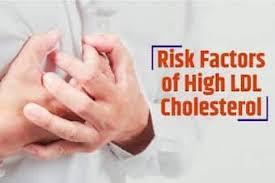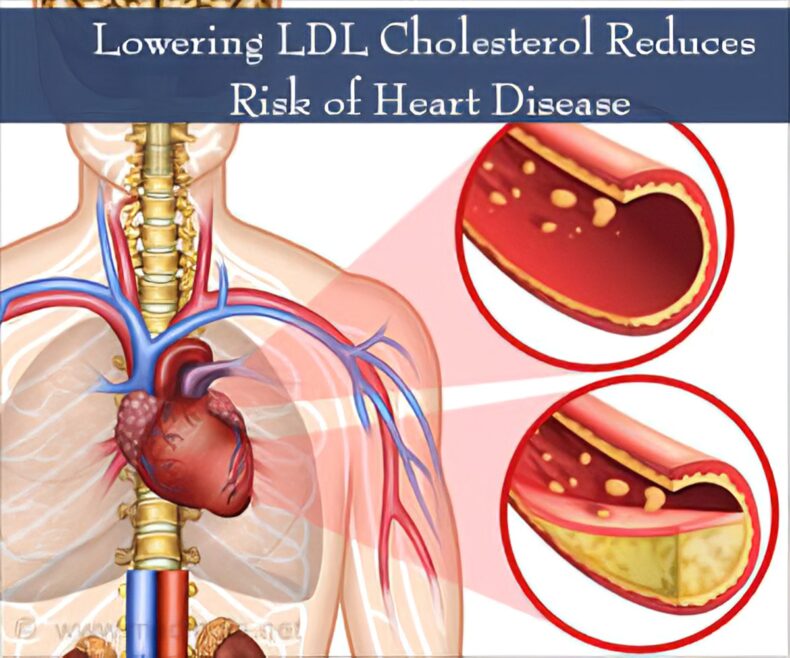Cholesterol is a waxy, fat-like compound found in all of our body’s cells. Our body requires cholesterol to produce hormones, vitamin D, and substances that aid in digestion and it produces all of the cholesterol it requires. Cholesterol can also be found in animal products such as egg yolks, meat, and cheese.

If your cholesterol level is high, you have a greater risk of developing fatty deposits in your blood vessels. At some point, these deposits will expand to the point that it will be impossible for sufficient blood to pass through your arteries. These deposits can sometimes unexpectedly break apart, resulting in the formation of a clot that can lead to a heart attack or stroke.
High cholesterol can be passed down through families, but it’s often caused by bad habits, which means it can be prevented and treated. High cholesterol can be lowered by eating well, working out often, and sometimes taking medicine.
If it is found, after some particular medical tests that a person has a high cholesterol level, it is advisable that the person should be under the regular supervision of a doctor.
Types of cholesterol
The majority of the cholesterol in your body is made up of LDL, also known as “bad” cholesterol. LDL stands for low-density lipoprotein. Your risk of developing heart disease and having a stroke is increased when your LDL cholesterol level is high.
The “good” cholesterol, also known as high-density lipoprotein (HDL), is responsible for absorbing cholesterol and transporting it back to the liver. After that, the liver will wash it out of the body. Your risk of developing heart disease and stroke may be reduced if you have a healthy amount of HDL cholesterol in your blood.
The following factors can increase your risk of having high cholesterol:

Inappropriate diet-Consuming an inappropriate amount of saturated fat, trans fat, or both can lead to dangerous levels of cholesterol in the body. Saturated fats can be found in foods like fatty cuts of meat and dairy products with full fat. Snacks and desserts that come in a packet frequently include trans fats.
A lack of physical activity-Doing regular exercises or physical activity is an important factor to remain fit and healthy. The “good” HDL cholesterol in your body can be increased by engaging in physical activity.
Obesity-The chances of having too much low-density lipoprotein (LDL), also known as “bad cholesterol,” in your blood increases, if you are overweight. This increases your risk of developing heart problems and other serious conditions. If you are overweight by 10 pounds, your body will manufacture an additional 10 milligrams of cholesterol on a daily basis for every pound that you are overweight.
Smoking habits-The negative effects of smoking extend well beyond the lungs. It can make you more likely to suffer from heart disease and stroke, as well as excessive cholesterol and other issues related to the health of your heart. When you smoke, your LDL cholesterol can go up and your HDL cholesterol can go down. Over time, this can cause your blood vessels and arteries to become inflamed and build up plaque which may somehow lead to blood clots and strokes.
Alcohol consumption-Consuming excessive amounts of alcohol have been linked to a variety of adverse health effects, including elevated levels of LDL, also known as “bad cholesterol,” as well as triglycerides and blood pressure.
There may be some other risk factors related to high cholesterol levels and all of those should be taken care of to lead a healthy life.
Complications related to high cholesterol levels–

india.com
When you have high cholesterol, dangerous amounts of cholesterol and other substances can build up on the walls of your arteries (atherosclerosis). Plaques can slow down the flow of blood through your arteries, which can lead to problems like:
Stroke-Your risk of having a stroke increases in proportion to the amount of LDL in your blood.
When there is an excessive amount of cholesterol in circulation, it can accumulate on the arterial walls and cause the arteries to become more constricted. This condition is known as atherosclerosis. It can generate blood clots, which in turn can block the flow of blood, which can result in an ischemic stroke.
Heart attack-If plaques break or tear, a blood clot can form at the place where the plaque broke, stopping the flow of blood or breaking off and blocking an artery further down. A heart attack happens when blood stops going to part of your heart.
Chest pain-When the coronary arteries, which carry blood to the heart, become damaged, and the patient may have chest pain (angina) and other symptoms.
Preventive measures
Modifying your diet and adopting other heart-healthy habits can both reduce your cholesterol levels and prevent them from ever rising to unhealthy levels. Cholesterol-lowering strategies include:
Eat less salt and more fruits, vegetables, and whole grains.
Animal fats should be kept to a minimum, and good fats should be used in moderation.
Doing regular exercise is also necessary.
Get rid of extra weight and stay at a healthy weight
Managing your stress is also recommended.
Quitting smoking and consuming alcohol at a moderate level are also preventive measures to keep your cholesterol levels normal.
If you have high cholesterol levels, it is always advisable to undergo regular medical screening for the well-being of your heart and your health as well.













